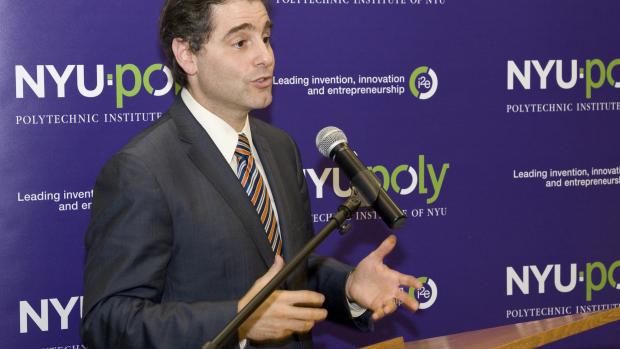NYU-Poly Welcomes Chairman of the Federal Communications Commission (FCC)

Broadband, net neutrality, and American innovation in the global marketplace were just some of the topics Julius Genachowski, Chairman of the Federal Communications Commission (FCC), addressed at Polytechnic Institute of NYU last Thursday. It was his only visit to an area university, and Congressman Edolphus Towns, who represents the 10th Congressional District of Brooklyn, home to NYU-Poly, and serves as Chairman of the Committee on Oversight and Government Reform, underscored the occasion by joining President Jerry M. Hultin in welcoming Chairman Genachowski to campus.
[GALLERY:4207|left]
Chairman Genachowski, Congressman Towns, and President Hultin chatted beneath the bright fall foliage of the MetroTech Commons before touring the NYU-Poly grounds. President Hultin gestured toward existing buildings and noted NYU-Poly’s plans to transform the campus. They strolled through the Jacobs Academic Building, stopping to talk to students participating in the final rounds of CSAW, NYU-Poly’s national cyber security competition, and through the Rogers Hall corridor — the first example of the Institute’s facilities transformation project. Their next stop was the Dibner Library where they met with faculty.
The FCC and Academia
President Hultin and Provost Dianne Rekow introduced Chairman Genachowski to faculty from the Electrical and Computer Engineering and Computer Science and Engineering departments who are conducting research on areas regulated by or of interest to the FCC. Faculty appeared eager to hear from Chairman Genachowski, with Katherine Isbister, associate professor of digital media and research director of the Game Innovation Lab, jumping in to ask, “Other than traditional media, how do games play into your strategy?”
Chairman Genachowski explained how his agency oversees the Universal Service Fund, which has a program called E-rate that supports programs and classrooms. “We’ve been trying to update it to facilitate 21st-century learning techniques,” he said. “I have three kids. I see how they interact with new media technologies, and I’m certainly interested in the potential opportunities around gaming-like activities to enhance learning.”
From there, the conversation ranged over many topics, such as the relationship between government and academia, as well as our shrinking broadband spectrum, which Yao Wang, professor of electrical and computer engineering, touched upon. "What do you see in the future in terms of accessing video in high quality over wireless?" she asked. Because video requires the transfer of large amounts of data, it consumes a significant amount of the broadband spectrum, but Chairman Genachowski believes video transfer must remain high quality. "People want to watch videos, wherever they are," he said. "That demand is what fuels our spectrum-capacity issues."
The discussion also covered net neutrality, which questions whether all content on the Internet should travel at the same speed. On that issue, Chairman Genachowski likened the Internet to a system of pipes, with the FCC as the caretaker of that system. “Our general policy has been to encourage unfettered activity inside the pipes, but certainly we hear more and more about market power growing in layers within them,” he said, “but the honest answer is we continue to be focused on the pipes themselves and keeping the data flowing.”
Carl Skelton, assistant professor of digital media, gently quipped, “So you’re neutral on net neutrality,” which prompted a smile and a laugh from Chairman Genachowski.
Governance and Innovation
The lively and pleasant exchange between faculty and Chairman Genachowski extended to the presentation that followed when he spoke to NYU-Poly students, faculty, staff, and invited guests. Introductions by Brooklyn Borough President Marty Markowitz and Congressman Towns preceded the chairman’s remarks, with the leaders focusing on Brooklyn’s growing importance to the technological future of the New York metropolitan area. “This is a secret to a lot of people,” said Towns, “but now people more and more will get to know that great things are coming from the students here who are showing initiative.”
The two expressed local pride, while President Hultin offered a global perspective. Describing a conversation he recently had with an official running one of the biggest cities in China, President Hultin spoke of the conflict there between efficiency and fairness, reminding the audience that the “tension between governance and innovation is one we also face here, and a regulator especially faces that tension.”
Chairman Genachowski accentuated President Hultin’s remarks by explaining where the United States stands among 40 countries that continue to develop broadband technologies: dead last. “The rest of the world is not standing still,” he said. “If we keep moving at the pace we’re moving, we'll fall even farther behind [in broadband innovation].”
New Initiatives at the FCC
Levity also punctuated the serious remarks. During the Q&A session that followed Chairman Genachowski’s remarks, one student asked which phone he uses. Cracking a grin, the chairman listed a Blackberry, Droid, and iPad. He then took the opportunity to introduce a new initiative related to the student’s question. “As an organization made up of people who are working on these policies, how does the FCC make sure that our staff has hands-on experience with cutting edge technologies so that they can actually get this stuff right?” the chairman asked.
To offset this issue, the FCC is establishing a technology experience center where its employees can try the latest devices. The center will function like a library, and eventually the public will also have access to it. The initiative will “increase the level of firsthand knowledge with devices and platforms,” explained Chairman Genachowski. “I think it will make for better policy.”
The chairman described other policies the FCC is enacting, such as releasing unlicensed spectrum. He closed his talk by assuring the audience that “we benefit the most as a country both economically but also in the spirit of free speech and the First Amendment by having a really vibrant marketplace for ideas.”




